Tucked away on a tidy farmyard down a narrow boreen, is home to one of Ireland’s brightest engineering companies. Denis Doyle Ltd is known in Irish machinery circles for products like its air seeder and disc harrows, but across America and Australia, Denis and his company are known in a different industry as the Irish company supplying high-end self-propelled pile drivers for solar farm contractors.
The business is up there with a list of Irish machinery manufacturers which started from humble beginnings, and have quickly evolved into international players. A real success story, the firm was set up in 1994, but didn’t venture into the solar industry business until 2010.
Background
After completing his leaving cert, Denis headed across the water to complete Agricultural Engineering at Harper Adams University.
For his six-month placement, he came back to Ireland and completed the stint with Armour Salmon in Carlow. Upon completing the course, he went to work full-time with Armour Salmon, while working with local agricultural contractor Roger Perry.
In 1994, Denis decided to venture out on his own. He began repairing farm machinery for local farmers and contractors. He continued at this, while growing crops on the family’s 230-acre tillage holding. In 1997, he ventured into post-drivers, with the UK being his main market. He also dabbled in silage forks, bringing a Hardox tine fork to the Ploughing Championships that same year, which he said garnered absolutely no interest. In the years that followed, he also fabricated excavator buckets and quick hitches, alongside combine header trolleys. When the Celtic tiger era faded away, Denis revamped his post driver, turning it into a vibrating machine.
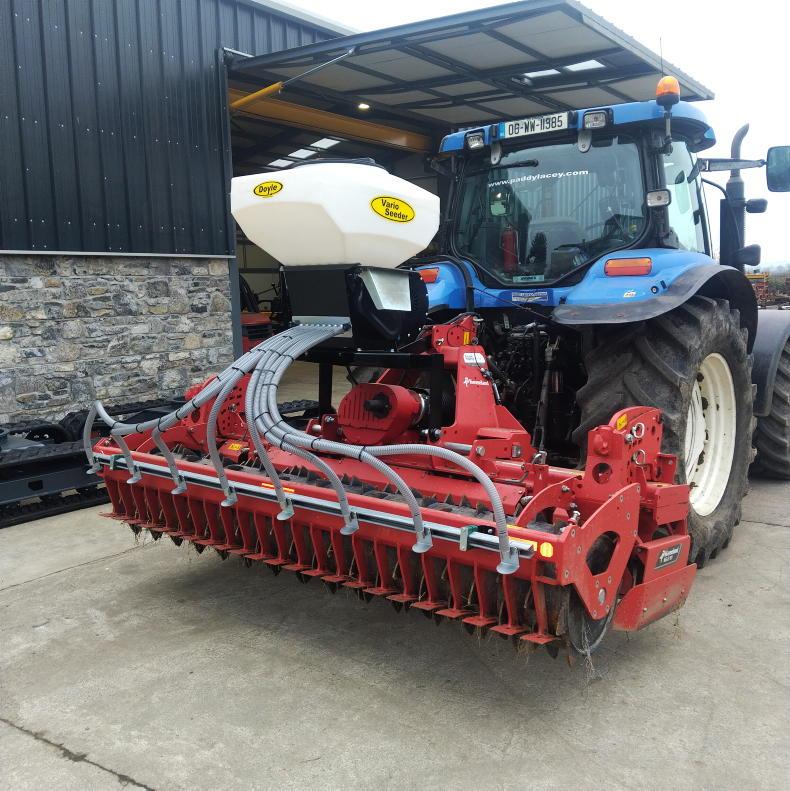
Doyle is producing up to 50 air seeders/year, with this accounting for about 10% of the business.
“When I look back at the products we made in the early years, I now call it Ryanair Engineering. A lot of common products that anyone can turn a hand to are generally a race to the bottom with price,” noted Denis.
Stumbling into solar
In 2010, he ended up fabricating a machine for the solar industry. “If you ask anyone in the solar industry, how did they get into it, they will all tell you they stumbled into it. One day, an American man in the solar business spotted our vibrating post driver online, and contacted me about making some modifications to my existing machine so it could drive the piles, which are essentially the foundations for solar panels.

The Nasku GPS controlled unit can be programmed to automatically drive the piles to the correct location, depth and angle to an accuracy of placement of 10mm.
“We proceeded to develop five or six different variants of the machine for this job over the following years, before going self-propelled in 2017.
“The move to the self-propelled machine has opened a lot of doors for us. We are now dealing with huge companies who are undertaking solar projects on massive scale- such as 2,000 to 5,000-acre projects. We now have over 100 self-propelled machines out working in the US alone, and are scaling up to produce in the region of 40 to 50 units per year.”
“At present, solar is the cheapest form of energy in the United States, and the industry is thriving over there. One project that our machines were used to construct was using solar energy power to make fresh water from salt water for irrigation purposes, while they were trying to utilise the leftover salts for battery production.
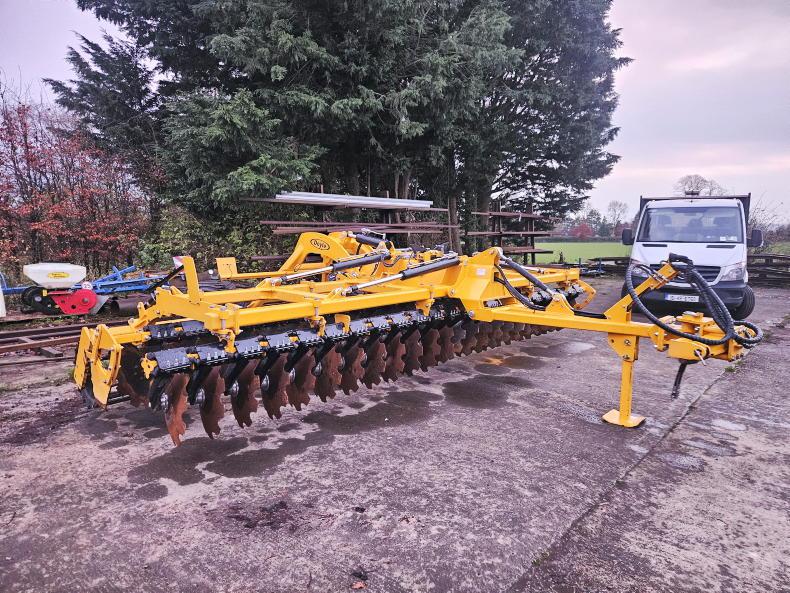
Doyle has recently developed his own version of a 4m, 5m and 6m trailed disc harrows.
“It’s eye-opening what’s going on in places. If you look at the US, it’s perfect for solar. Lots of big flat plains of land with loads of sunshine.
In June, we exhibited at the Inter-Solar show in Germany. It was a success and has opened more doors for us in Europe,” explained Denis.
Self-propelled pile driver Doyle’s self-propelled pile driver, the Rambo 500, is powered by one of three 74hp engines, a Hatz, Yanmar or Kubota engine, with engine selection depending on its end destination and emission regulations. The undercarriage is quite similar to a Tekeuchi tracked dumper. Shod on 400m rubber tracks, the machine weighs in at 5.3t. The unit is fitted with a 120l/min piston pump with load sensing hydraulics and an oversized cooler. The telescopic mast drives piles up to 6.1m long. The hammer is sourced from the proven Japanese manufacturer Furukawa, while they use all Nelson hydraulics and source rams from Burnside in Tullow.
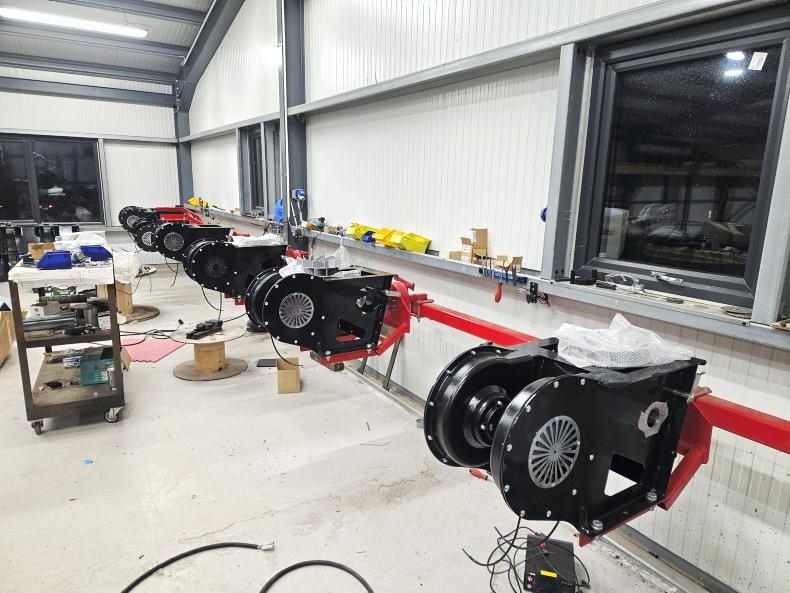
The air seeder assembly line.
When we visited, Doyle and his team had just completed the installation of a fully automatic, Nasku GPS controlled unit which is programmed to automatically drive the piles to the correct location, depth and angle to an accuracy of placement of 10mm. This system turns the Rambo 500 into a fully automated machine. Despite the GPS system alone costing €50,000, Doyle claims that the technology will almost double the machines daily output, with the savings meaning users would potentially pay for the additional tech in just six months.

With the business having experienced exponential growth in recent years, Denis has moved to subbing out up to 60% of the firm’s fabrication.
“Because our machines work remotely all over the world, we need reliable components that can be sourced off the shelf. We use proven engines and pumps, IFM German electronics, and for example, a New Holland diesel cap.
“Simple things can let any machine down, so we try to manufacture machines that anyone can easily source parts for. We are currently working on a prototype machine for laying out the piles, before the pile driver comes along.
“At present, a skid steer and two people are needed to do this job, but we are working on a design that will reduce this to just one labour unit. It will work in sync with the pile driver”, noted Denis.
At the National Ploughing Championships in 2015, Doyle unveiled his new air seeder which was designed for attachment on cultivators/power harrows. The machine sources an air supply from two separate electric impeller fans, while the power supply comes directly from the tractor battery.
The seed is passed to the ground via eight delivery pipes on to the individual splash plate mounted at the end of each pipe.
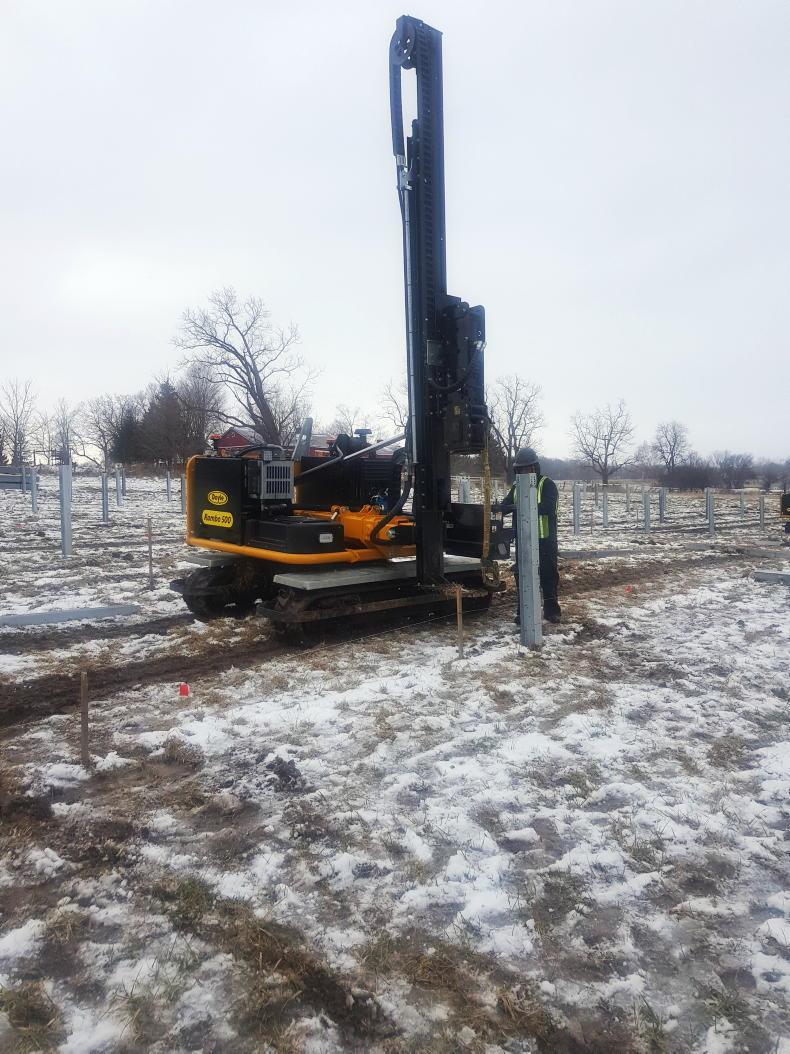
A Rambo 500 at work in the USA.
“A neighbour of mine, George Coyle was importing air seeders. One day we were chatting and he explained how getting parts was sometimes an issue.
“As the conversation went on, we decided to try to build one, with the idea that there was no Irish manufacturer building them, and that it would replace an import,” said Denis.
Since then, Doyle has built over 500 seeders, with units working in Ireland, the UK, New Zealand, the Netherlands and Belgium. Annual production is now up to 50 units/year, with this accounting for about 10% of Doyle’s business.

“Today, we are exporting in the region of 90% of what we manufacture".
Doyle began importing Rolmako disc harrows in 2018, which have proven to be a good machine. Since then, he has retailed units across the country quite steadily. Doyle has recently developed his own version of a 4m, 5m and 6m trailed disc harrows. Only a handful of units have made their way on to the market to date, but the company has plans to soon push their design across Ireland and further afield.
Denis employs eight full-time staff, all of whom have been in the business for many years. With the business having experienced exponential growth in recent years, Denis has moved to subbing out up to 60% of the firm’s fabrication. Approximately 50% of this work is carried out by local engineering businesses, with the other 50% taking place overseas.

Denis Doyle
“It’s hard to get good staff, so we decided to sub out some of production work instead. The one thing that I have found over the years is that you need to be able to develop an efficient design in-house, before you sub that section out externally. One of the most important tools in the company that aided the design and production of the Rambo 500 is utilising 3D CAD software. This has been a game changer for us. For example, a mast assembly on the Rambo including nuts, bolts and washers has over 1,000 parts. It’s a must that engineering firms have the ways and means of doing that in-house first, such as laser cutters, press brakes, robot welders etc. We try and run things as efficiently as possible,” said Denis.
“Today, we are exporting in the region of 90% of what we manufacture. We export to the US, Germany, UK, Portugal, Belgium, Honduras, Hungary, Bulgaria, Australia, New Zealand, Canada, and have to Russia in the past.
“The US is currently accounting for around 70% of our exports, but other markets are starting to grow quickly.
“The biggest threat to our business right now is Donald Trump, and what he may or may not do once he’s inaugurated.
“His election rhetoric was about slapping on tariffs on imports, so one move from him could have a massive impact on our business.”
“In the coming years we will continue to develop and fine tune our product offering. We have a new design soon ready for market with our trailed disc harrows, and soon hope to add weigh cells to our air seeders. I believe the big growth for our company will be in solar. Solar is continuing to gain traction across the world, and labour is an issue everywhere. If we can double our machines output by adding tech, while halving the labour required to lay out the piles, it’s going to be a win-win and should be a big seller in the market place.”
In short
Business: Denis Doyle Ltd.Established: 1994. Managing director: Denis Doyle.Export markets: 12.Employees: Eight.Address: Heath, Athy, Co Kildare. 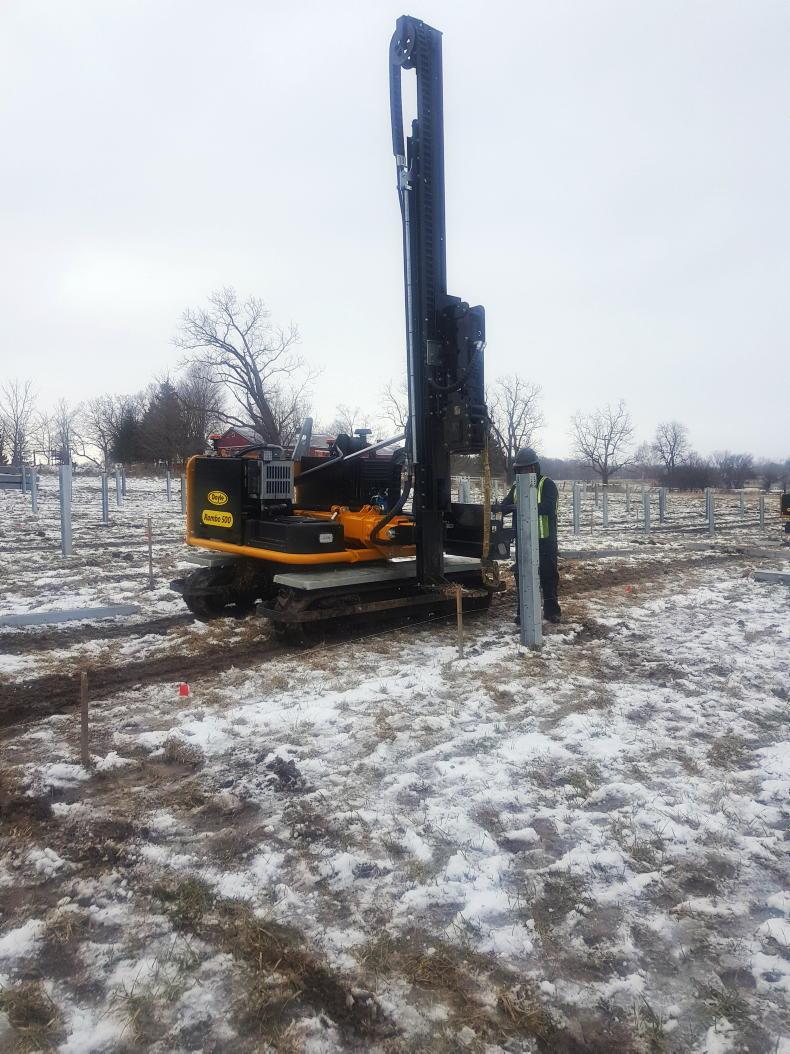
Denis Doyle
Tucked away on a tidy farmyard down a narrow boreen, is home to one of Ireland’s brightest engineering companies. Denis Doyle Ltd is known in Irish machinery circles for products like its air seeder and disc harrows, but across America and Australia, Denis and his company are known in a different industry as the Irish company supplying high-end self-propelled pile drivers for solar farm contractors.
The business is up there with a list of Irish machinery manufacturers which started from humble beginnings, and have quickly evolved into international players. A real success story, the firm was set up in 1994, but didn’t venture into the solar industry business until 2010.
Background
After completing his leaving cert, Denis headed across the water to complete Agricultural Engineering at Harper Adams University.
For his six-month placement, he came back to Ireland and completed the stint with Armour Salmon in Carlow. Upon completing the course, he went to work full-time with Armour Salmon, while working with local agricultural contractor Roger Perry.
In 1994, Denis decided to venture out on his own. He began repairing farm machinery for local farmers and contractors. He continued at this, while growing crops on the family’s 230-acre tillage holding. In 1997, he ventured into post-drivers, with the UK being his main market. He also dabbled in silage forks, bringing a Hardox tine fork to the Ploughing Championships that same year, which he said garnered absolutely no interest. In the years that followed, he also fabricated excavator buckets and quick hitches, alongside combine header trolleys. When the Celtic tiger era faded away, Denis revamped his post driver, turning it into a vibrating machine.

Doyle is producing up to 50 air seeders/year, with this accounting for about 10% of the business.
“When I look back at the products we made in the early years, I now call it Ryanair Engineering. A lot of common products that anyone can turn a hand to are generally a race to the bottom with price,” noted Denis.
Stumbling into solar
In 2010, he ended up fabricating a machine for the solar industry. “If you ask anyone in the solar industry, how did they get into it, they will all tell you they stumbled into it. One day, an American man in the solar business spotted our vibrating post driver online, and contacted me about making some modifications to my existing machine so it could drive the piles, which are essentially the foundations for solar panels.

The Nasku GPS controlled unit can be programmed to automatically drive the piles to the correct location, depth and angle to an accuracy of placement of 10mm.
“We proceeded to develop five or six different variants of the machine for this job over the following years, before going self-propelled in 2017.
“The move to the self-propelled machine has opened a lot of doors for us. We are now dealing with huge companies who are undertaking solar projects on massive scale- such as 2,000 to 5,000-acre projects. We now have over 100 self-propelled machines out working in the US alone, and are scaling up to produce in the region of 40 to 50 units per year.”
“At present, solar is the cheapest form of energy in the United States, and the industry is thriving over there. One project that our machines were used to construct was using solar energy power to make fresh water from salt water for irrigation purposes, while they were trying to utilise the leftover salts for battery production.

Doyle has recently developed his own version of a 4m, 5m and 6m trailed disc harrows.
“It’s eye-opening what’s going on in places. If you look at the US, it’s perfect for solar. Lots of big flat plains of land with loads of sunshine.
In June, we exhibited at the Inter-Solar show in Germany. It was a success and has opened more doors for us in Europe,” explained Denis.
Self-propelled pile driver Doyle’s self-propelled pile driver, the Rambo 500, is powered by one of three 74hp engines, a Hatz, Yanmar or Kubota engine, with engine selection depending on its end destination and emission regulations. The undercarriage is quite similar to a Tekeuchi tracked dumper. Shod on 400m rubber tracks, the machine weighs in at 5.3t. The unit is fitted with a 120l/min piston pump with load sensing hydraulics and an oversized cooler. The telescopic mast drives piles up to 6.1m long. The hammer is sourced from the proven Japanese manufacturer Furukawa, while they use all Nelson hydraulics and source rams from Burnside in Tullow.

The air seeder assembly line.
When we visited, Doyle and his team had just completed the installation of a fully automatic, Nasku GPS controlled unit which is programmed to automatically drive the piles to the correct location, depth and angle to an accuracy of placement of 10mm. This system turns the Rambo 500 into a fully automated machine. Despite the GPS system alone costing €50,000, Doyle claims that the technology will almost double the machines daily output, with the savings meaning users would potentially pay for the additional tech in just six months.

With the business having experienced exponential growth in recent years, Denis has moved to subbing out up to 60% of the firm’s fabrication.
“Because our machines work remotely all over the world, we need reliable components that can be sourced off the shelf. We use proven engines and pumps, IFM German electronics, and for example, a New Holland diesel cap.
“Simple things can let any machine down, so we try to manufacture machines that anyone can easily source parts for. We are currently working on a prototype machine for laying out the piles, before the pile driver comes along.
“At present, a skid steer and two people are needed to do this job, but we are working on a design that will reduce this to just one labour unit. It will work in sync with the pile driver”, noted Denis.
At the National Ploughing Championships in 2015, Doyle unveiled his new air seeder which was designed for attachment on cultivators/power harrows. The machine sources an air supply from two separate electric impeller fans, while the power supply comes directly from the tractor battery.
The seed is passed to the ground via eight delivery pipes on to the individual splash plate mounted at the end of each pipe.

A Rambo 500 at work in the USA.
“A neighbour of mine, George Coyle was importing air seeders. One day we were chatting and he explained how getting parts was sometimes an issue.
“As the conversation went on, we decided to try to build one, with the idea that there was no Irish manufacturer building them, and that it would replace an import,” said Denis.
Since then, Doyle has built over 500 seeders, with units working in Ireland, the UK, New Zealand, the Netherlands and Belgium. Annual production is now up to 50 units/year, with this accounting for about 10% of Doyle’s business.

“Today, we are exporting in the region of 90% of what we manufacture".
Doyle began importing Rolmako disc harrows in 2018, which have proven to be a good machine. Since then, he has retailed units across the country quite steadily. Doyle has recently developed his own version of a 4m, 5m and 6m trailed disc harrows. Only a handful of units have made their way on to the market to date, but the company has plans to soon push their design across Ireland and further afield.
Denis employs eight full-time staff, all of whom have been in the business for many years. With the business having experienced exponential growth in recent years, Denis has moved to subbing out up to 60% of the firm’s fabrication. Approximately 50% of this work is carried out by local engineering businesses, with the other 50% taking place overseas.

Denis Doyle
“It’s hard to get good staff, so we decided to sub out some of production work instead. The one thing that I have found over the years is that you need to be able to develop an efficient design in-house, before you sub that section out externally. One of the most important tools in the company that aided the design and production of the Rambo 500 is utilising 3D CAD software. This has been a game changer for us. For example, a mast assembly on the Rambo including nuts, bolts and washers has over 1,000 parts. It’s a must that engineering firms have the ways and means of doing that in-house first, such as laser cutters, press brakes, robot welders etc. We try and run things as efficiently as possible,” said Denis.
“Today, we are exporting in the region of 90% of what we manufacture. We export to the US, Germany, UK, Portugal, Belgium, Honduras, Hungary, Bulgaria, Australia, New Zealand, Canada, and have to Russia in the past.
“The US is currently accounting for around 70% of our exports, but other markets are starting to grow quickly.
“The biggest threat to our business right now is Donald Trump, and what he may or may not do once he’s inaugurated.
“His election rhetoric was about slapping on tariffs on imports, so one move from him could have a massive impact on our business.”
“In the coming years we will continue to develop and fine tune our product offering. We have a new design soon ready for market with our trailed disc harrows, and soon hope to add weigh cells to our air seeders. I believe the big growth for our company will be in solar. Solar is continuing to gain traction across the world, and labour is an issue everywhere. If we can double our machines output by adding tech, while halving the labour required to lay out the piles, it’s going to be a win-win and should be a big seller in the market place.”
In short
Business: Denis Doyle Ltd.Established: 1994. Managing director: Denis Doyle.Export markets: 12.Employees: Eight.Address: Heath, Athy, Co Kildare. 
Denis Doyle










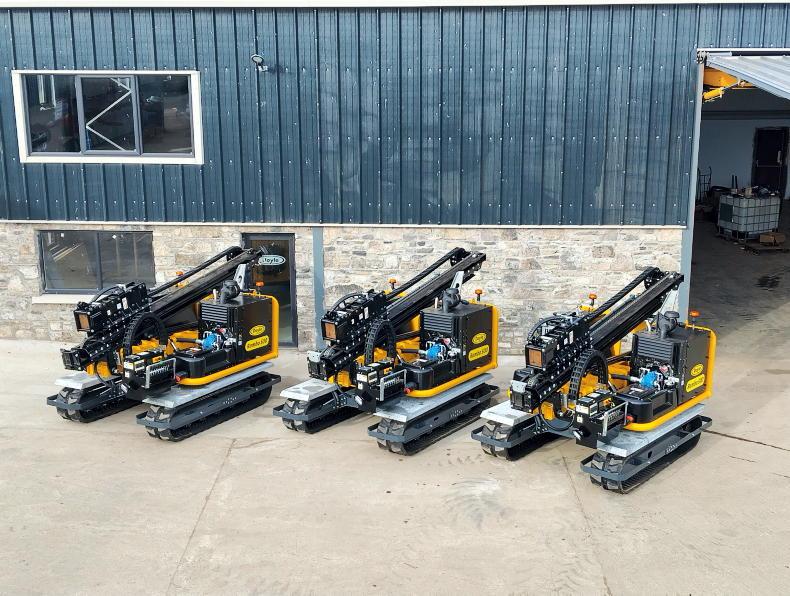





 This is a subscriber-only article
This is a subscriber-only article










SHARING OPTIONS: